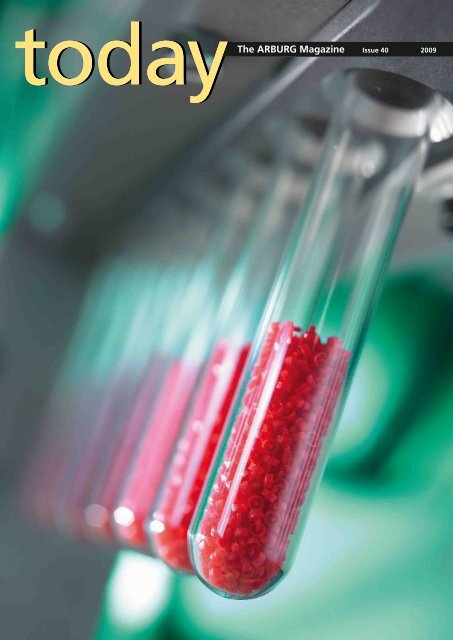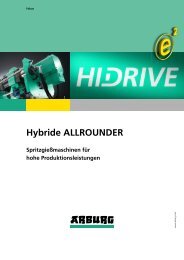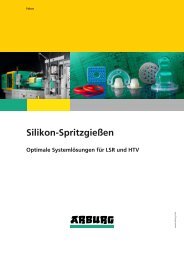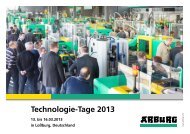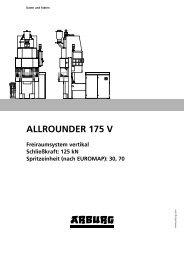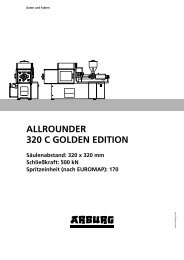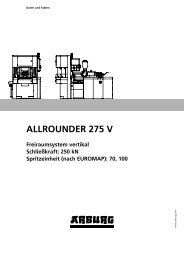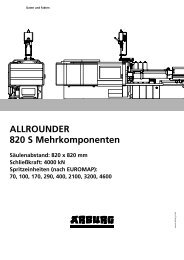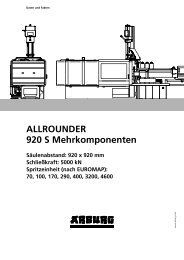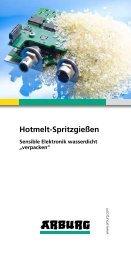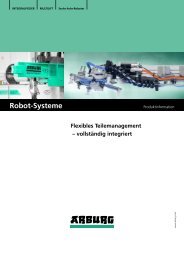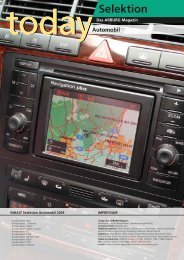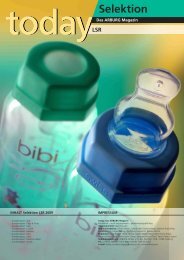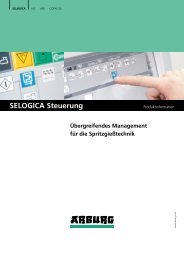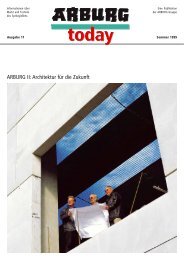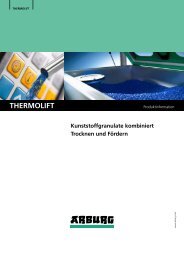The ARBURG Magazine - British Plastics & Rubber
The ARBURG Magazine - British Plastics & Rubber
The ARBURG Magazine - British Plastics & Rubber
Create successful ePaper yourself
Turn your PDF publications into a flip-book with our unique Google optimized e-Paper software.
<strong>The</strong> <strong>ARBURG</strong> <strong>Magazine</strong> Issue 40 2009
CONTENTS<br />
4<br />
6<br />
9<br />
10<br />
12<br />
13<br />
14<br />
16<br />
19<br />
20<br />
22<br />
MASTHEAD<br />
Our company<br />
By us, for you<br />
Customer report<br />
Binder: Streamlined and efficient<br />
Our company<br />
Continuously improving<br />
Customer report<br />
Taiwan Powder Technologies: Spurred on by customer demands<br />
Product<br />
Worth its weight in gold<br />
Subsidiary<br />
Presence in Arabia<br />
Customer report<br />
Vitop: Fresh on tap from bag-in-box<br />
Project<br />
MKT: For cars, the future’s blue<br />
Our company<br />
Around the globe<br />
Co-operation<br />
IWK: A refined look and a cool touch<br />
Tech talk<br />
Energy-efficient drives<br />
today, the <strong>ARBURG</strong> magazine, issue 40/2009<br />
Reprints - including excerpts - only by express permission<br />
Responsible: Matthias Uhl<br />
Editorial advisory board: Oliver Giesen, Juliane Hehl, Martin Hoyer, Herbert Kraibühler,<br />
Bernd Schmid, Jürgen Schray, Wolfgang Umbrecht, Renate Würth<br />
Editorial team: Uwe Becker (text), Nicolai Geyer (text), Markus Mertmann (photos),<br />
Oliver Schäfer (text), Vesna Sertić (photos), Susanne Wurst (text), Peter Zipfel (layout)<br />
Editorial address: <strong>ARBURG</strong> GmbH + Co KG, Postfach 1109, 72286 Lossburg, Germany<br />
Tel.: +49 (0) 7446 33-3105, Fax: +49 (0) 7446 33-3413<br />
e-mail:today_kundenmagazin@arburg.com, www.arburg.com<br />
2 today 40/2009<br />
Big on small components: <strong>ARBURG</strong><br />
impressively demonstrates its expertise<br />
in micro injection moulding at<br />
the Fakuma 2008, with a complex<br />
production cell for manufacturing<br />
micro gear wheels weighing just<br />
0.001 grams.
Last year, we took our<br />
“Technology on Tour” around<br />
the world with great success,<br />
drawing the attention of the<br />
international injection moul-<br />
ding industry to the subject of energy efficiency,<br />
shedding light on the various factors influencing energy<br />
consumption in injection moulding, and highlighting<br />
potential savings.<br />
Dear Readers,<br />
However, for us the efficient use of energy is a matter of<br />
priority not just for our products, but in our company as<br />
well. This year in Lossburg, you will be able to see for<br />
yourselves how our new building embodies the concept<br />
of energy efficiency. <strong>The</strong> new Customer Center will<br />
open its doors to coincide with our Technology Days,<br />
which will be held from 19 to 21 March 2009. Make the<br />
most of this opportunity to marvel at the possibilities<br />
that we have to offer. You may well be excited to see<br />
what innovations we will be presenting at the Techno-<br />
logy Days. So don’t let this opportunity slip away.<br />
Also new and improved are our Projects and Applica-<br />
tions Technology departments, likewise with the goal of<br />
providing you with even better advice and support in<br />
future. But our investments are not limited to Lossburg,<br />
as demonstrated by the opening of our sales and service<br />
office in the United Arab Emirates.<br />
So as you can see, we are certainly not burying our<br />
heads in the sand during these economically difficult<br />
times. Instead, we are looking towards the future and<br />
continuing to develop ourselves and our products,<br />
thereby sending out a clear signal that in <strong>ARBURG</strong> you<br />
have a strong, reliable partner with whom to jointly face<br />
a positive future.<br />
We hope you enjoy reading this new issue.<br />
today 40/2009<br />
3<br />
Juliane Hehl<br />
Managing Partner & Managing Director<br />
EDITORIAL
After almost two years of construction<br />
work, the new<br />
<strong>ARBURG</strong> Customer Center will<br />
open in March for the Technology Days<br />
2009 and will then be handed over to<br />
those for whom it was built: all our customers.<br />
<strong>The</strong> pride felt by Michael Hehl,<br />
Managing Partner & Spokesperson for<br />
the Management Team, with regard to<br />
the success of this building project is<br />
evident in his words: “<strong>The</strong> intention of<br />
the new building was to enable us to<br />
bring our customers even more satisfaction<br />
than before. But of course we<br />
also wanted to surprise them a little<br />
with what we have planned and implemented<br />
for their benefit.”<br />
This objective seems to have been fulfilled<br />
and reveals itself to every visitor entering<br />
the new building, which contains as<br />
much structural steel as is required for 60<br />
houses. Everything is light, spacious and<br />
finely wrought - you immediately have the<br />
feeling of being right at the centre of<br />
things. As well as the reception, waiting<br />
and meeting area, the new building also<br />
houses all departments that have contact<br />
with customers. You will never have far to<br />
go to benefit from comprehensive <strong>ARBURG</strong><br />
expertise. At the heart of the building is<br />
the Customer Center’s 2,100-square-<br />
metre area for machines and production<br />
cells. Here, <strong>ARBURG</strong>’s entire product range<br />
is available not just “for show”, but to<br />
demonstrate its performance capabilities<br />
live to all customers. This facilitates the<br />
machine selection process and also makes<br />
it easier to carry out trials and acceptance<br />
tests. In addition, applications such as<br />
powder injection moulding and clean<br />
room technology with their ALLROUNDERs<br />
are also incorporated, in order to display<br />
to perfection the diversity of techniques<br />
covered by <strong>ARBURG</strong> machines.<br />
“<strong>ARBURG</strong> is well known for its company<br />
policy of continuously improving all<br />
customer services. Once again, we have<br />
done all we can to ensure that our customers<br />
feel at home and well looked after<br />
when they come to us,” says Helmut Heinson,<br />
Managing Director Sales, explaining<br />
the objectives of the new building. “With<br />
our new premises, we can deal very flexibly<br />
with visitors’ wishes and queries, and<br />
4 today 40/2009<br />
By us,<br />
Photo: seelig + partner<br />
therefore show them that we have based<br />
our entire business on them and their<br />
needs.”<br />
Herbert Kraibühler, Managing Director<br />
Technology & Engineering, adds this: “Our<br />
new building reflects and strengthens our<br />
policy of proximity to our customers and<br />
clearly indicates that in these economically<br />
turbulent times, we are ready for the future,<br />
especially in terms of customer services.<br />
At the same time, this construction<br />
project also demonstrates our clear commitment<br />
to Germany as our production location<br />
and our basic principle “Made by<br />
<strong>ARBURG</strong> - Made in Germany”. We believe<br />
that this is the only way that we can guarantee<br />
our high quality standards for all<br />
customers all over the world. Finally, the<br />
energy-efficient concept of the new building<br />
demonstrates once again that we put<br />
“Energy Efficiency” into practice not just<br />
in our machines, but throughout our<br />
ALLROUNDERs, in our company and in our<br />
advice to our customers.”
for you<br />
Flashback. <strong>ARBURG</strong> on 28 March 2007:<br />
this was the date of the ground-breaking<br />
ceremony in the Oberndorfer Strasse in<br />
Lossburg, attended by managing partners,<br />
the management team, as well as regional<br />
and local council representatives. This moment<br />
heralded the official launch of the<br />
company’s largest construction project<br />
since the plant was extended by the “factory<br />
of glass”. <strong>The</strong> focus lay clearly on the<br />
sustained optimisation of customer support.<br />
It was important that all departments<br />
relevant to customers should be reached<br />
quickly and distances kept short. And this<br />
explains the name of the building project:<br />
the new “<strong>ARBURG</strong> Customer Center”.<br />
Now as ever, this name epitomises the<br />
company’s motivating force - that of providing<br />
its customers with genuine all-round<br />
service. Now that the new building section<br />
is complete, it is clear that the <strong>ARBURG</strong><br />
Customer Center is impressive in every respect.<br />
Moreover, all those responsible<br />
unanimously agree that it has more than<br />
satisfied its objectives. Now we simply have<br />
to fill it with people.<br />
today 40/2009<br />
5<br />
INFOBOX<br />
OUR COMPANY<br />
Managing Partners Renate Keinath,<br />
Juliane Hehl and Michael Hehl (from left to<br />
right) all agree: “<strong>The</strong> new Customer Center<br />
offers the perfect environment for first-class<br />
customer support.”<br />
Location: Lossburg, Germany<br />
Size: Around 10,000 square metres,<br />
of which 2,100 square metres are<br />
dedicated to the central machine,<br />
demonstration and testing zone<br />
Concept: Central port of call for all<br />
customers to reach all the departments<br />
necessary for customer support<br />
Machines: Over 30 ALLROUNDERs of<br />
all types and performance categories<br />
with the necessary peripherals, as well<br />
as various project systems
Personnel-intensive production<br />
in Germany? At first glance, this<br />
seems like an anachronism. But<br />
if we take a look behind the scenes at<br />
Franz Binder GmbH + Co. elektrische<br />
Bauelemente KG in Neckarsulm, a<br />
world market leader for circular connectors,<br />
we will see that this is not the<br />
case. Thanks to modern production<br />
technology and organisation, this family-run<br />
company produces extremely<br />
cost-effectively despite high numbers<br />
of personnel.<br />
“We decided to take this route in 2006<br />
with the appointment of team managers<br />
and the introduction of lean management<br />
processes,” explains Managing Director<br />
Markus Binder, son of the company founder,<br />
Franz Binder. This was followed in 2007<br />
by the reorganisation of the production areas,<br />
as previously production, assembly and<br />
the warehouse were located at three different<br />
sites in Neckarsulm, so that a great<br />
deal of time and expense were spent on logistics<br />
and organisation. “This situation<br />
simply arose organically through our continuous<br />
expansion in Neckarsulm,” explains<br />
Franz Binder. Thanks to his responsibility for<br />
his workforce, which he refers to as his<br />
“most important capital”, and his entrepreneurial<br />
courage, which he has proven with<br />
a strategy of “continuity even when times<br />
get tough”, Binder has made his company<br />
a world leader. In order to maintain this position,<br />
Markus Binder has charted a course<br />
towards lean production, with the aim of<br />
achieving short delivery and development<br />
times through modernisation and improved<br />
flexibility. In addition to long transport distances<br />
and the large warehouse, the company<br />
also faced the problem of different<br />
production, tooling and machine concepts<br />
and the resulting high set-up times and<br />
costs.<br />
Simultaneously the company was confronted<br />
with changing market require-<br />
6 today 40/2009<br />
Streamlined<br />
ments such as faster delivery times, high<br />
adherence to deadlines, accuracy of production<br />
numbers, increasing version diversity,<br />
reduced batch sizes, greater product<br />
customisation and higher quality requirements.<br />
In order to comprehensively satisfy<br />
these demands, the “Binder Added Value<br />
System (BAVS)”, which is based on lean<br />
management and the Toyota Production<br />
System (TPS), was introduced. Key elements<br />
of this strategy are, for example, the<br />
concentration of added value in a single location<br />
where possible, the training of small,
and efficient<br />
independent production units, and the<br />
shifting of responsibility and decision-<br />
making as far down the hierarchy as possible,<br />
in order to promote fast, flexible reactions.<br />
A further element is the implementation<br />
of objectives through workshops, in<br />
which employees work on solutions together<br />
with managers and specialist personnel.<br />
Markus Binder sums up the advantages<br />
as follows: “When everyone knows<br />
what the goal is, everyone can contribute.”<br />
One of the first steps was to divide the<br />
sites according to production fields and to<br />
establish production teams. <strong>The</strong> result is<br />
that there are no more central departments<br />
for quality assurance, production control<br />
Photos: Binder<br />
and planning or procurement, for example.<br />
Rather, each team is made up of employees<br />
from these areas who, together with<br />
their colleagues from Production, assume<br />
responsibility for the products in question.<br />
Due to the small batch sizes of 250 to<br />
300 units on average, frequent mould<br />
changes - around three per shift - are the<br />
order of the day. To keep the set-up times<br />
short, Binder increasingly makes use of<br />
master moulds with cassette technology.<br />
As only the cassettes are changed, set-up<br />
times were cut by around 80 %. Today,<br />
20 of the 50 moulds employed for cable<br />
production are cassette moulds, almost all<br />
of which are produced by the company.<br />
Further steps were the segmentation of<br />
products into medical, sensor and industrial<br />
technologies, the standardisation of<br />
work operations and the establishment of<br />
decentralised individual stores directly on<br />
the production lines, as well as linkage of<br />
the individual workstations. A good example<br />
of lean production is provided by the<br />
production lines for encapsulated connectors,<br />
each of which consists of a compact,<br />
flexible cable cutting system, an automatic<br />
crimping machine with process monitoring<br />
for reproducible connections, and a<br />
vertically operating ALLROUNDER 275 V.<br />
Thanks to their free-space system and minimal<br />
footprint, <strong>ARBURG</strong> vertical machines<br />
are ideal for this task. In addition to their<br />
today 40/2009<br />
7<br />
CUSTOMER REPORT<br />
From left to right, Plant Manager<br />
Thomas Schulin and Managing Director<br />
Markus Binder are very happy with the<br />
efficient connector production in independent<br />
production units.<br />
good accessibility<br />
and<br />
compact<br />
design, they excel thanks to their technical<br />
equipment, as Plant Manager Thomas<br />
Schulin explains: “With the positionregulated<br />
screw option, we achieve extremely<br />
high process stability and therefore<br />
high product quality. Moreover, simultaneous<br />
movement by the ejector and the<br />
mould was made possible especially for our<br />
machines, in order to shorten cycle times.”<br />
Monitoring by internal pressure sensors, to<br />
guarantee constant mould filling, is anoth-
CUSTOMER REPORT<br />
Manual insertion of cables in the<br />
ALLROUNDER 275 V has proven<br />
its worth (right). ALLROUNDERs with<br />
swivelling clamping unit offer a high<br />
degree of flexibility (below).<br />
er special feature. As<br />
these production lines<br />
with ALLROUNDER 275 V<br />
machines have proved successful,<br />
two have already been installed in the<br />
USA, and two more are planned for the<br />
Chinese factory.<br />
<strong>The</strong> operator makes use of the time<br />
saved from the optimised injection moulding<br />
cycle for electrically testing the finished<br />
parts, with insulation tests at high voltage,<br />
for example. Rejects, which cannot be entirely<br />
avoided due to electrical faults, are<br />
separated immediately, so that production<br />
takes place with accurate numbers and<br />
100 % quality. By linking the individual<br />
workstations, the throughput time for encapsulated<br />
connectors has been reduced<br />
from about three weeks to a single day, or<br />
a few hours in some cases. And the onepiece-flow<br />
concept means that the first<br />
part is produced and ready for shipment in<br />
just a few minutes. Because of small batch<br />
sizes, only individual components, not the<br />
complete production line, are automated.<br />
“Another reason for manual work,” comments<br />
Thomas Schulin, is that cables are<br />
“alive” and don’t always behave in the<br />
same way.” When it comes to inserting cables,<br />
people are still more flexible than machines.<br />
“We are continually recognising<br />
new potential areas<br />
for optimisation, even in<br />
the production sequences<br />
that we<br />
have already reorganised,<br />
and we set about implementing<br />
them,” says Markus Binder,<br />
and explains that “there is no definite<br />
end to the implementation of the BVAS.<br />
Rather, it is an ongoing process.”<br />
8 today 40/2009<br />
INFOBOX<br />
Photos: Binder<br />
Founded: In 1960 by Franz Binder<br />
Group: Binder Connector Group and<br />
Binder Systems Group<br />
Plants: Germany, Switzerland,<br />
France, China, USA, United Kingdom<br />
Employees: Around 1,300, approx.<br />
550 of whom are in Neckarsulm<br />
Turnover: € 120 million overall,<br />
€ 70 million for the Connector Group<br />
Products: Industrial connectors, plug<br />
connectors for automation technology,<br />
customised solutions. 10,000 different<br />
individual components, 4,300 catalogue<br />
items, 3,000 versions and<br />
around 40 million connectors annually<br />
Machine fleet: 53 injection<br />
moulding machines with clamping<br />
forces from 250 to 700 kN,<br />
including 48 ALLROUNDERs<br />
Contact: Franz Binder GmbH + Co.<br />
elektrische Bauelemente KG,<br />
Rötelstrasse 27,<br />
74172 Neckarsulm, Germany,<br />
www.binder-connector.de
<strong>ARBURG</strong> has never rested on its<br />
laurels. And this is why we are<br />
continually striving to improve<br />
still further. <strong>The</strong> latest example is the<br />
expansion and reorganisation of the<br />
Projects and Applications Technology<br />
departments, with the aim of providing<br />
our customers with even better,<br />
more intensive support in future, and<br />
making all <strong>ARBURG</strong>’s expertise available<br />
to them.<br />
When it comes to projects and applications<br />
technology, we focus on individual<br />
customer requirements - and consequently<br />
on customer-specific, competent advice<br />
and support.<br />
For this reason, the Projects department<br />
has been expanded to include Commissioning.<br />
Consequently, both the experts who<br />
elaborate and implement projects and the<br />
skilled personnel who commission systems<br />
at <strong>ARBURG</strong> and on customer premises have<br />
now been merged into one compact department<br />
and share a common responsibility.<br />
“This way, all those involved get to<br />
know the systems in detail from the very<br />
beginning, communication channels are<br />
shortened and reaction times are faster,”<br />
says Managing Director Sales Helmut Heinson,<br />
listing the advantages of the expanded<br />
Project department, under Head of Department<br />
Oliver Giesen. Customers all over<br />
the world benefit from this solution, whether<br />
they are in Germany or its neighbouring<br />
countries and receive support directly from<br />
the Project department, or whether they<br />
are further afield and contact and co-ordination<br />
is provided by responsible engineers<br />
at the <strong>ARBURG</strong> subsidiaries. <strong>The</strong> Applications<br />
Technology department has also been<br />
reorganised with the aim of improving<br />
customer support. It still covers the three<br />
areas, “Injection moulding” for in-house<br />
production of moulded parts, “Technical<br />
Center”, the central port of call for customer<br />
tests, and “Application-specific consulting”.<br />
But now the range of the last two<br />
services, in particular, has been considerably<br />
expanded. For example, we not only<br />
run tests on machines, moulds and processes<br />
with and for customers in the Technical<br />
Center, but also subsequently compile<br />
extensive documentation that customers<br />
can use to achieve the results obtained<br />
here in their own injection moulding<br />
plant.<br />
<strong>The</strong> greatest innovation, however, relates<br />
to application-specific consulting, as<br />
the area of responsibility has not only<br />
grown tremendously, but has also become<br />
more international. Previously, the extensive<br />
pool of expertise covering all injection<br />
moulding technologies and sectors was only<br />
resorted to in the case of specific queries<br />
regarding machines, moulds and process<br />
technology. In future, the motto will be<br />
“Don’t react - act!” This will ensure that<br />
customers around the world can gain individual,<br />
on-site advice on the one hand, and<br />
that our expert knowledge can be disseminated<br />
internationally at seminars on the<br />
other - a concept that enjoyed outstanding<br />
today 40/2009<br />
9<br />
OUR COMPANY<br />
Concentrated expertise: Jürgen Schray,<br />
Dr. Thomas Walther and Oliver Giesen (from left to right).<br />
Continuously improving<br />
success in our “Technology on Tour 2008”,<br />
with the subject of “Energy Efficiency<br />
Allround”. “Jürgen Schray, with his many<br />
years of experience and extensive knowledge,<br />
is the ideal person to meet the challenges<br />
of this extensive new applicationtechnology<br />
consulting task,” confirms<br />
Managing Director Sales Helmut Heinson.<br />
And Dr. Thomas Walther will take on the<br />
management of the Applications Technology<br />
department in order to dedicate himself<br />
wholly to its extended area of responsibility.<br />
“Thanks to his previous position in<br />
the Development department, Dr. Walther<br />
has the perfect background to lead<br />
<strong>ARBURG</strong> successfully into the future in the<br />
field of applications technology,” says<br />
Helmut Heinson, summing up the co-<br />
ordinated reorganisation of these departments,<br />
which will offer an improved consulting<br />
service for the benefit of all our<br />
customers.
Our customers’ require<br />
This is how Dr. Y.C. Lu, founder<br />
and managing director of Taiwan<br />
Powder Technologies (TPT),<br />
describes his company’s philosophy.<br />
Since Taiwan Powder Technologies<br />
Co., Ltd. was founded in 2001, it has<br />
worked exclusively in the production<br />
of moulded parts from metal powder,<br />
covering the entire value-added chain.<br />
For its injection moulding, TPT relies<br />
on a total of 21 ALLROUNDERs.<br />
Since TPT commenced operations in<br />
Dasi in Northern Taiwan, the local specialists<br />
have been working with ALLROUNDERs<br />
from <strong>ARBURG</strong>. <strong>The</strong>ir commercial success<br />
speaks for itself: the company grew by<br />
30 % during each of the last three years,<br />
becoming the largest producer of metal injection<br />
moulded (MIM) parts in Taiwan.<br />
TPT focuses primarily on the market for<br />
computers, telecommunications and customer<br />
electronics, for which it produces a<br />
wide range of parts, such as hinge and<br />
structural parts. But TPT has also enjoyed<br />
considerable growth in medical techno logy<br />
and in the automotive and tools industries.<br />
TPT is able to provide its customers with<br />
production and support services throughout<br />
the value-added chain. <strong>The</strong>se services<br />
include support with part and mould design,<br />
mould engineering, the selection and<br />
preparation of all the necessary materials,<br />
plus injection moulding, debinding and sintering.<br />
One of the big advantages of TPT is<br />
the customer specific material development<br />
based on the specification of the injection<br />
moulded part and the application<br />
of the final part. “This has enabled us to<br />
become the top company in the Taiwanese<br />
and Chinese markets,” says Dr. Lu, explaining<br />
the company’s successful expansion,<br />
“but we want more than that. For the international<br />
market also holds enormous<br />
potential for our products. And we want to<br />
increasingly expand in this direction in<br />
future.”<br />
However, the company intends to expand<br />
not just economically, but also in<br />
terms of physical space. At the end of<br />
2008, another 1,300 square metres were<br />
added to the existing production area of<br />
3,200 square metres. TPT is certified to ISO<br />
9001 and QC080000 ROHS. It plans to introduce<br />
quality assurance in accordance<br />
with TS 16946 in May 2009.<br />
TPT’s product portfolio now comprises<br />
almost 600 different MIM parts. <strong>The</strong> metal<br />
content of the compounds used for production<br />
generally consist of iron-nickel<br />
alloys and type 316L/17-4ph stainless steel,<br />
10 today 40/2009<br />
but other individually composed alloys are<br />
also used. Hammer Lin, Special Assistant<br />
Production, Engineering and QA at TPT,<br />
explains: “We produce our feedstocks inhouse.<br />
This not only means lower costs for<br />
the provision of raw materials that are partly<br />
very cost-intensive, it also means greater<br />
flexibility and fast reaction times to customer<br />
requests. This has turned out to be one<br />
of our most important advantages in this<br />
business.”<br />
Of the 23 machines that TPT has<br />
integrated in its production, 21 are<br />
ALLROUNDERs that produce the MIM parts<br />
in three-shift operation. <strong>The</strong> machines are<br />
automated, because in Taiwan, cost pressure<br />
from the People’s Republic of China is
also evident. “In order to remain pioneers,<br />
we have to invest not only in our technology,<br />
but also in our knowledge, our quality,<br />
our service and our employees,”<br />
explains Hammer Lin.<br />
At TPT, the ALLROUNDERs have a reputation<br />
for reliability and durability. According<br />
to TPT engineers, the material feed - a<br />
decisive factor in achieving a constantly<br />
high-quality MIM process - functions so<br />
precisely that specifications from the computer<br />
and electronics industry can be completely<br />
fulfilled. <strong>The</strong> highly wear-resistant<br />
cylinders and screws are also important for<br />
TPT, as they compensate for the high abrasion<br />
that occurs during MIM processing<br />
during a long service life.<br />
Dr. Lu sums up as follows: “We have<br />
been completely satisfied right from the<br />
start, both with the technology and the<br />
support provided by C&F, <strong>ARBURG</strong>’s trading<br />
partner in Taiwan. Another major advantage<br />
of the ALLROUNDERs is the<br />
SELOGICA machine control system. This<br />
permits a great deal of freedom in system<br />
programming. Via this operating unit, we<br />
can also easily and reliably incorporate<br />
our robotic systems in the production<br />
sequence. What’s more, the<br />
process data can be quickly collated<br />
and evaluated during production.<br />
Photos: TPT<br />
We repeatedly benefit from problem analysis<br />
and complete production sequences.<br />
This is the main reason why we rely almost<br />
completely on <strong>ARBURG</strong> injection moulding<br />
technology, because for us, only the results<br />
matter. And our ALLROUNDERs achieve<br />
perfect results with all our products. <strong>The</strong><br />
prospects for continued co-operation in<br />
future are therefore excellent.”<br />
today 40/2009<br />
11<br />
TPT uses ALLROUNDER injection moulding<br />
technology to produce its MIM compo-<br />
nents (below). Founder and Managing<br />
Director Dr. Y.C. Lu (left) confirms to<br />
Uwe Haupt of <strong>ARBURG</strong> Sales that he is<br />
INFOBOX<br />
CUSTOMER REPORT<br />
extremely satisfied with <strong>ARBURG</strong><br />
injection moulding technology.<br />
ments are our yardstick<br />
Location: Dasi, Taiwan<br />
Employees: Approximately 110 at<br />
the central production facility<br />
Products: MIM parts for 3C<br />
(computer, communication and<br />
customer) electronics, medical technology<br />
and the tools industry, throughout<br />
the entire value-added chain<br />
Machine fleet: 23 machines,<br />
21 ALLROUNDERs with clamping forces<br />
between 400 and 500 kN<br />
Contact: Taiwan Powder Technologies<br />
Co. Ltd., No.63 Jhonghua Rd.,<br />
Dasi Township, Taoyuan County,<br />
335, Taiwan, www.tpttw.com.tw
PRODUCT<br />
Photo: Kaltschmidt GmbH<br />
<strong>The</strong> new combination comprising<br />
the ALLROUNDER GOLDEN<br />
EDITION and MULTILIFT V<br />
SELECT robotic system, which was first<br />
presented to the public at the Fakuma<br />
2008, met with a great deal of enthusiasm<br />
and interest right from the start.<br />
One of the first companies to order the<br />
new production unit was Kaltschmid<br />
GmbH in Schorndorf.<br />
<strong>The</strong> integrated robotic system is available<br />
for the ALLROUNDER GOLDEN<br />
EDITION 270 C to 570 C, with a clamping<br />
force range from 400 to 2,000 kN.<br />
<strong>The</strong> MULTILIFT V SELECT features a maximum<br />
handling weight of six kilograms.<br />
What’s more, the scope of delivery includes<br />
the adapter platen for attachment to the<br />
machine, electrically integrated guarding,<br />
a conveyor belt for part set-down and CE<br />
certification for the entire system.<br />
Ralf Kaltschmid, a Managing Director of<br />
Kaltschmid GmbH, decided to buy this configuration<br />
straight away at the Fakuma,<br />
and has not regretted this move: “When<br />
we got a closer look at the system, first of<br />
all we were impressed with its compact design.<br />
<strong>The</strong>n there were various possibilities<br />
for achieving the cost-effective production<br />
of technically sophisticated moulded parts.<br />
<strong>The</strong> guarding and CE certification guarantee<br />
high safety standards. We had already<br />
been considering a compact production<br />
solution of this kind, and then spontaneously<br />
decided to buy, because the <strong>ARBURG</strong><br />
configuration conformed exactly to our<br />
ideals. We already have some experience<br />
with the use of various robotic systems, including<br />
with ALLROUNDERs, but we were<br />
delighted with the fascinating technology<br />
of the MULTILIFT V SELECT from the outset.<br />
We will produce high-quality products<br />
on this system. For this purpose, we make<br />
use of the ‘Select/Separate’ function,<br />
which enables simultaneous quality monitoring<br />
of parts during production and immediate<br />
downstream packaging of good<br />
parts. This system gives us greater reliability<br />
for our users, but also for our production.<br />
And finally, set-up is easier, too.<br />
So all in all, our production<br />
becomes<br />
more flexible.”<br />
12 today 40/2009<br />
Worth its<br />
weight in gold<br />
Ralf Kaltschmid (left) was immediately<br />
delighted with the new ALLROUNDER<br />
GOLDEN EDITION and MULTILIFT V<br />
SELECT combination.
Presence in Arabia<br />
Since 1 January 2009, <strong>ARBURG</strong> has<br />
been represented in the United<br />
Arab Emirates (UAE) with its<br />
own sales and service office. <strong>The</strong> new<br />
organisation and ALLROUNDER injection<br />
moulding technology were presented<br />
at the Arabplast, which took<br />
place in Dubai from 10 to 13 January.<br />
“<strong>The</strong> Arabian market offers a great deal<br />
of potential as regards technologically<br />
sophisticated applications, which is why we<br />
have decided to make long-term investments<br />
in this market,” explained Managing<br />
Director Sales Helmut Heinson at the<br />
<strong>ARBURG</strong> press conference during the Arabplast.<br />
<strong>ARBURG</strong> has founded its own organisation<br />
in the United Arab Emirates, in order<br />
to provide customers in the Arab states<br />
with even more intensive support in future.<br />
<strong>The</strong> head of the new sales and service office<br />
is the manager of <strong>ARBURG</strong>’s Dutch<br />
subsidiary, Carlo Brouwer, who knows the<br />
UAE countries intimately and has already<br />
made numerous business contacts here.<br />
“Our high-tech machines amply satisfy<br />
the exacting requirements of the<br />
booming Arabian market in all areas<br />
- the dominant packaging industry,<br />
for example, and the<br />
growing sector of technical and<br />
medical moulded part production,”<br />
says Carlo Brouwer. <strong>The</strong> Arabplast<br />
exhibit and application were selected with<br />
this in mind: the high-precision production<br />
of syringe barrels on an electric<br />
ALLROUNDER 570 A with high-performance<br />
plasticising cylinder and a 48-cavity<br />
mould.<br />
Those responsible were extremely<br />
pleased with the exhibition. “<strong>The</strong> Arabplast<br />
was characterised not so much by the<br />
quantity but rather the quality of the visitors.<br />
This made it possible for us to provide<br />
all trade visitors with intensive support and<br />
individual advice, and to present <strong>ARBURG</strong><br />
technology in detail,” says the manager of<br />
the new sales and service office, whose<br />
team has many years of experience with<br />
ALLROUNDERs in the UAE. “With Waddah<br />
Jaara, who is responsible for sales, and our<br />
service technician, we have been able to<br />
today 40/2009<br />
13<br />
SUBSIDIARY<br />
Photo: Photodisc<br />
Photos: Shivram M. Nair<br />
Visitors to the Arabplast and the high-ranking dele-<br />
gation accompanying the UAE’s Minister for Foreign<br />
Trade, H. E. Sheikha Lubna Bint Khalid Al Qasimi<br />
(above, second from left.) were well looked after by<br />
Waddah Jaara and Carlo Brouwer (above, right).<br />
acquire highly qualified employees,<br />
who will provide our customers<br />
with first-class support,” says<br />
Carlo Brouwer with delight.<br />
As with all <strong>ARBURG</strong>’s international<br />
organisations, the new office<br />
in the United Arab Emirates will offer<br />
the entire range of services: sales, service,<br />
spare parts, applications technology and<br />
training. “Following the foundation of our<br />
own sales and service office at the beginning<br />
of the year, we have now also found<br />
perfect premises in Ras Al Khaimah, and<br />
are therefore gradually reinforcing and<br />
extending our service offering,” says<br />
Helmut Heinson, explaining the company’s<br />
next steps.
14 today 40/2009<br />
Fresh on tap<br />
Photos: Vitop<br />
Italian firm Vitop Moulding s.r.l. in<br />
Alessandria specialises in the production<br />
of taps for bag-in-box<br />
packaging. This is a business with ideal<br />
prospects for the future, for people<br />
will always get thirsty and practical,<br />
inexpensive packaging is growing<br />
in popularity worldwide. For the<br />
production of these precision components,<br />
<strong>ARBURG</strong> has delivered two fully-electric<br />
ALLROUNDER A machines<br />
to Italy.<br />
<strong>The</strong> basic principle has been with us for<br />
a long time: the Ancient Greeks used to<br />
store their wine in sealed tubes made from<br />
goatskin. But consumers had to wait until<br />
1955 for the invention of the bag-in-box<br />
design. A major advantage of bag-in-box<br />
packaging (BIB) is that no air can penetrate<br />
the contents, extending the use-by date.<br />
Furthermore, it is easier to transport and<br />
cheaper overall than bottles, for example.<br />
Today, not just numerous foodstuffs are<br />
filled in these containers, but also pharmaceutical<br />
and chemical products.<br />
Special taps are required for dispensing<br />
wine and other products from these modern-day<br />
tubes. <strong>The</strong>se must be compatible<br />
with the product and remain absolutely<br />
leak-proof during their useful life. Not only<br />
that, they act as a quality seal, sometimes<br />
as a bearer of tax stamps and are an important<br />
part of the packaging design.<br />
<strong>The</strong> Italian company Vitop Moulding<br />
s.r.l. in Alessandria in Piedmont specialises<br />
in the production of these precision components.<br />
Originally founded by René Erb in<br />
1992 under the name of Wicotop, the company<br />
was taken over by the Irish Jefferson<br />
Smurfit Group in 1996, which then merged<br />
with the Dutch company Kappa Packaging<br />
in 2005 to form the Smurfit Kappa Group<br />
(SKG) in Dublin. Also in 1996, Vitop purchased<br />
a new production site in Alessandria<br />
covering 15,000 square metres. Here,<br />
individual components for taps, plugs and<br />
connectors for BIBs are produced on 30 injection<br />
moulding machines with clamping<br />
forces from 800 to 2,200 kN. <strong>The</strong> materials<br />
used are polypropylene, polyethylene<br />
and special plastics. For removal, Vitop employs<br />
robots.<br />
Its primary markets are Europe and<br />
North and South America. Vitop is certified<br />
to ISO 9001:2000, HACCP and NSF. <strong>The</strong><br />
Hazard Analysis and Critical Control Point<br />
(HACCP) concept is a preventive system intended<br />
to guarantee the safety of foodstuffs<br />
and consumers. NSF International
from bag-in-box<br />
was identified by the World Health Organisation<br />
(WHO) as an international centre of<br />
collaboration for the safety and preparation<br />
of drinking water.<br />
<strong>The</strong> fully automated assembly of the end<br />
products takes place in a separate clean<br />
room, which conforms to the strict guidelines<br />
of the food industry. Each assembly<br />
section is equipped with optical monitoring<br />
systems for quality control. Faulty parts are<br />
automatically separated straight away. In<br />
addition, each tap must undergo a leak test<br />
at a pressure of 0.4 bar.<br />
In the light of all the stringent quality requirements,<br />
it is understandable that Vitop<br />
can accept no compromises when it comes<br />
to its machine equipment. “We haven’t received<br />
a single complaint about leaky taps<br />
for more than ten years,” says Didier<br />
Pontcharraud, Managing Director of Vitop.<br />
“Since we have already had very good<br />
experiences with the reliability and cost-<br />
effectiveness of the fully hydraulic<br />
ALLROUNDER C series, we recently decided<br />
to purchase two fully electric machines<br />
from the ALLROUNDER A series as well,”<br />
he says, explaining the company’s decision<br />
to invest. What’s more, the co-operation<br />
between the two companies also has a<br />
ten-year history.<br />
Fully electric ALLROUNDER A injection<br />
moulding machines are predestined for the<br />
production of moulded parts for medical<br />
technology and the food industry. <strong>The</strong>y operate<br />
quickly, precisely, cleanly, with a high<br />
degree of reproducibility and energy<br />
efficiency, and with low noise emissions.<br />
Vitop employs an electric ALLROUNDER<br />
420 A and a 570 A with clamping forces of<br />
1,000 and 2,000 kN respectively in its production.<br />
As production in Alessandra continues<br />
around the clock, seven days a week,<br />
the machines are constantly at work.<br />
This makes regular maintenance, carried<br />
out partly by Vitop, partly by the <strong>ARBURG</strong><br />
Service, all the more important.<br />
<strong>The</strong> growth in the market for BIBs<br />
is demonstrated by the 10% annual growth<br />
in Wine Bag-in-Box consumption in<br />
Europe. So, excellent prospects for growth<br />
- not least for the co-operation between<br />
Vitop and <strong>ARBURG</strong>!<br />
today 40/2009<br />
15<br />
INFOBOX<br />
CUSTOMER REPORT<br />
Italian firm Vitop Moulding S.r.l.<br />
in Alessandria specialises<br />
in the production of taps for<br />
bag-in-box packaging.<br />
Employees: Approx. 70<br />
Machine fleet: 30<br />
Products: Taps for flexible and<br />
rigid drink containers, connectors<br />
and carry straps<br />
Contact: Vitop Moulding S.r.l.,<br />
Via Enzo Ferrari 39, Zona Industriale<br />
D3, 15100 Alessandria (Piedmont),<br />
Italy, www.vitop.fr
Today, more than ever, innovative<br />
concepts for the “car of<br />
the future” are in demand. At a<br />
time when car manufacturers and, to<br />
an even greater extent, their suppliers,<br />
are suffering from a severe global<br />
recession, so-called “future technologies”<br />
are absolutely vital. One<br />
of these future technologies has been<br />
developed by Mercedes Benz Cars:<br />
“BLUETEC”, an exhaust gas filtering<br />
system for diesel vehicles. MKT Metall-<br />
und Kunststofftechnik GmbH<br />
supplies housings and covers for the<br />
control unit of the urea sensor, which<br />
they produce on ALLROUNDERs.<br />
<strong>The</strong> highly automated production cell<br />
was developed in close co-operation and<br />
consultation between MKT and the<br />
<strong>ARBURG</strong> Project department. It incorporates<br />
an ALLROUNDER 1200 T 800-150<br />
rotary table machine with a clamping<br />
force of 800 kN and size 150 injection<br />
unit, a Scara robot and FPT handling system.<br />
<strong>The</strong> entire system is operated centrally<br />
via the SELOGICA machine control<br />
system. <strong>The</strong> first step of the process for<br />
Photo: MKT<br />
the production cell is the pre-sorting of<br />
the contacts, followed by the provision<br />
of the 14 pins by the Scara insertion<br />
robot. <strong>The</strong> FPT handling system is responsible<br />
for both removing and setting down<br />
the finished moulded parts, and for<br />
16 today 40/2009<br />
For<br />
inserting the contacts in the mould.<br />
Following their insertion in the two cavities,<br />
encapsulation of the contacts begins.<br />
Next, the finished parts are removed<br />
by the FPT handling system and conveyed<br />
to a downstream camera check.
cars, the future’s<br />
blue<br />
<strong>The</strong> Fuchs camera system consists of<br />
four cameras, and monitors the presence<br />
and position of the contacts, checks for<br />
burrs on the connector shroud and monitors<br />
the presence and position of the<br />
locking hook, which secures the two<br />
parts. If the moulded parts are recognised<br />
as “OK”, the good parts are marked<br />
and deposited in blister packs on a<br />
Schuma palletising system. <strong>The</strong> latter features<br />
a feed and exit section as a buffer,<br />
and can therefore work self-sufficiently<br />
for eight to ten hours.<br />
<strong>The</strong> two-cavity mould with a second,<br />
separate lower section for dual-station<br />
production works with sensor scanning,<br />
to ensure perfect monitoring of the presence<br />
and position of the contacts. This<br />
ensures that there are no downtimes during<br />
production.<br />
Wolfgang Ebner, Managing Director at<br />
MKT, is delighted with the production<br />
cell: “This complex, automated system<br />
was the first production unit that we installed<br />
and started up in our new<br />
2,250-square-metre company building,<br />
which we acquired at the end of 2008.<br />
<strong>The</strong> system works without problem,<br />
enabling us to be a reliable supplier of<br />
this promising technology for Mercedes-<br />
Benz.”<br />
<strong>The</strong> BLUETEC pollutant reducing system<br />
is the diesel vehicle’s closest equivalent<br />
to the catalytic converter for petrol<br />
engines. Mercedes Benz Cars developed<br />
this filter technology exclusively for<br />
Mercedes-Benz vehicles. BLUETEC is al-<br />
ready used with great success in cars for<br />
the US market, but also in Germany, the<br />
first mass-production vehicles with<br />
BLUETEC have already taken to the<br />
road.<br />
This technology incorporates several<br />
different pollutant-reducing variants<br />
which, besides reducing hydrocarbons,<br />
carbon monoxide and particulates, are also<br />
intended to break down nitrogen<br />
oxides. <strong>The</strong> components produced by<br />
MKT are employed in the SCR<br />
(Selective Catalytic Reduction)<br />
process for a urea sensor that<br />
ensures precisely the correct<br />
dosage of the aqueous AdBlue<br />
urea solution, which is<br />
contained in an additional<br />
tank in the vehicle.<br />
AdBlue is converted into ammonia in<br />
the exhaust pipe. In the downstream SCR<br />
catalytic converter, the ammonia changes<br />
the nitrogen oxides into harmless nitrogen<br />
and water. In this way, up to<br />
80 % of nitrogen oxides in diesel vehicles<br />
can be filtered. This is an extremely interesting<br />
technology, which owes its perfect<br />
function not least to the high precision<br />
of ALLROUNDER injection moulding<br />
machines.<br />
MKT has known for a long time that<br />
it can trust in the reliability of <strong>ARBURG</strong><br />
technology. <strong>The</strong> company was founded<br />
from the Wehrle company following a<br />
management buyout in 1996 and had already<br />
worked with ALLROUNDERs before.<br />
Today, the German plants of MKT<br />
today 40/2009<br />
17<br />
PROJECT<br />
Housing and cover for the control unit of the<br />
BLUETEC urea sensor (below). Project managers<br />
at MKT: Hans-Joachim Dietsche, Injection<br />
Moulding Manager, Wolfgang Ebner,<br />
Managing Director and Edgar Blatter, Mould<br />
Construction Manager (left, from left to right).<br />
Metall- und Kunststofftechnik GmbH are<br />
principally occupied with the production<br />
of housings for electronic assemblies for<br />
the automotive industry, metal-plastic<br />
bonds and moulded parts from two components.<br />
70 % of production is dedicated<br />
to the automotive sector, but customers<br />
also include office furniture and the<br />
aviation industry, supplying guides or inserts<br />
for tables on aeroplanes, for example.<br />
Engineering plastics such as PA 6, PA<br />
66, PBT, TPU, TPE and POM are predominantly<br />
used for processing. Here is what<br />
Hans-Joachim Dietsche, Injection Mould-
PROJECT<br />
ing Manager, has to say: “Above all, we<br />
produce metal encapsulations and connector<br />
housings for the automotive industry,<br />
and have to comply with very strict tolerances.<br />
We achieve this not just by satisfying<br />
the stipulations of QS 9001:2001,<br />
but also, above all, by our use of <strong>ARBURG</strong><br />
injection moulding machines. Our entire<br />
machine fleet - all twelve injection moulding<br />
machines - are ALLROUNDERs.<br />
<strong>The</strong> clamping force range extends up to<br />
1,500 kN. What’s more, our oldest machine<br />
is from 1985 and is still operating in<br />
our production. For us, this is a sure sign<br />
of a very special quality.”<br />
<strong>The</strong> ALLROUNDER machines are serviced<br />
partly internally and partly by the<br />
<strong>ARBURG</strong> Service, which Dietsche also regards<br />
as very good and competent: “We<br />
have a good, direct line to <strong>ARBURG</strong>, which<br />
provides for the fast procurement of spare<br />
parts when necessary. Our proximity to<br />
the plant in Lossburg, but also our direct<br />
points of contact in Sales and Service ensure<br />
that all our queries and wishes are<br />
dealt with smoothly and efficiently.”<br />
Wolfgang Ebner adds: “Our co-operation,<br />
which goes back many years, rests on four<br />
major pillars: direct communication, trustworthy<br />
points of contact, solid collaboration<br />
and the proximity of the sites.”<br />
<strong>ARBURG</strong> machine technology is also<br />
bound to receive a positive rating, because<br />
the co-operation functions so well.<br />
Says Hans-Joachim Dietsche: “We are<br />
particularly pleased that <strong>ARBURG</strong> still has<br />
spare parts for our older machines in<br />
stock. This ensures that we can be a reliable<br />
supplier to our customers. But our<br />
new ALLROUNDERs are just as popular<br />
among our installation technicians and<br />
operators, one major reason being the<br />
graphic SELOGICA user interface. This<br />
way, we can handle even complex injection<br />
moulding jobs with ease.”<br />
You will see that this is no exaggeration<br />
if you take a look at the automatic production<br />
cell for the AdBlue sensor housing<br />
in action: everything functions without<br />
any problems via one central control<br />
system. To produce future technology, you<br />
need future-oriented machine technology.<br />
<strong>ARBURG</strong>: helping to make the eco-friendly<br />
“car of the future” a reality.<br />
18 today 40/2009<br />
Cameras monitor the presence and position<br />
of the contacts, the formation of burrs and<br />
the presence and position of the locking<br />
hook (large photo). Next, the parts are<br />
deposited in blister packs (small photo).<br />
INFOBOX<br />
Founded: In 1996 by a management<br />
buyout of the Wehrle company<br />
Location: Germany<br />
Employees: 40<br />
Products: Urea sensor (AdBlue), housing<br />
for diesel pre-heater control units<br />
(Opel, Mercedes-Benz), housings for<br />
win dow winders, sunroof control (Porsche),<br />
guides for tables in aeroplanes,<br />
inserts for armrests in aeroplanes.<br />
Machine fleet: Twelve ALLROUNDERs<br />
with a clamping force of up to 1,500 kN<br />
Contact: MKT Metall- und Kunststofftechnik<br />
GmbH, Unter Greut 9,<br />
D- 79790 Küssaberg, Germany,<br />
www.mkt-gmbh.org
Photos: C.Tirel & S. O´Leary<br />
Around the globe<br />
Photo: Loddewynx J.-P.<br />
In 2008, <strong>ARBURG</strong> took its “Technology<br />
on Tour” around the world, in<br />
order to sensitise the international<br />
injection moulding industry to the<br />
subject of energy efficiency. All participants<br />
were unanimous in their positive<br />
response to these events, and here<br />
at <strong>ARBURG</strong>, we are also very pleased<br />
with how the tour went.<br />
<strong>The</strong> results speak for themselves - 45<br />
events all over the world, some lasting several<br />
days, with an average of 90 visitors<br />
each. Target groups included not just existing<br />
and potential customers, representatives<br />
from the industry and trade journalists<br />
- some events were also attended by<br />
trainees from the plastics sector and<br />
schoolchildren.<br />
“Technology on Tour” encountered<br />
huge interest on its journey,<br />
which started in Europe,<br />
continued through America<br />
and culminated in<br />
Asia. Participants<br />
were thoroughly impressed<br />
whatever<br />
the event -<br />
open house, seminars or the<br />
truck with an electric<br />
ALLROUNDER 320 A on<br />
board. <strong>ARBURG</strong> was also<br />
extremely satisfied. Helmut Heinson,<br />
Managing Director Sales, praised all<br />
participating subsidiaries and trading partners:<br />
“With ‘Technology on Tour’, we<br />
pushed the topic of energy efficiency into<br />
the spotlight world-wide and positioned<br />
ourselves as a competent point of contact<br />
in the matter of energy efficiency.”<br />
A key element of the series of events<br />
was the in-depth presentation, “Energy<br />
Efficiency Allround”, in which the injection<br />
moulding process as a whole was examined<br />
under the microscope with regard to<br />
energy consumption. At some events, the<br />
theory was directly demonstrated in<br />
practice. Hydraulic and electric<br />
ALLROUNDER machines of the<br />
same size were equipped with<br />
identical moulds and produced a<br />
demo moulded part. Energy consumption<br />
measurements then revealed<br />
that the electric machine had<br />
consumed up to 40 % less energy<br />
than its hydraulic counterpart.<br />
today 40/2009<br />
19<br />
OUR COMPANY<br />
<strong>The</strong> combination of indepth<br />
presentations, discussions<br />
with experts and<br />
live demos met with overwhelming<br />
approval from participants:<br />
“<strong>ARBURG</strong> has truly hit the mark with the<br />
energy efficiency theme. In view of rising<br />
prices for raw materials and energy, the<br />
subject of energy saving is becoming ever<br />
more important. This series of events supplied<br />
sufficient amounts information, and<br />
provided specific suggestions for savings<br />
potentials.”<br />
Visitors to “Technology on Tour”<br />
were offered numerous platforms at<br />
which they could obtain and<br />
exchange information.
A refined loo<br />
In addition to its own extensive<br />
development work, <strong>ARBURG</strong> also<br />
co-operates intensively with institutes<br />
and research facilities, with the<br />
aim of jointly uncovering new fields<br />
of application for injection moulding.<br />
A prime example here is our cooperation<br />
with the institute of materials<br />
technology and plastics processing<br />
(Institut für Werkstofftechnik und<br />
Kunststoffverarbeitung - IWK) at the<br />
Rapperswil college of engineering<br />
(Hochschule für Technik Rapperswil -<br />
HSR) in Switzerland.<br />
<strong>The</strong> IWK supports the plastics-processing<br />
industry in Switzerland by consistently<br />
and methodically combining and further<br />
developing materials and plastics. “We regard<br />
the fields of injection moulding and<br />
fibre composite engineering with a modern<br />
infrastructure as the professional basis<br />
for our work,” says the Director of the institute,<br />
Prof. Dr.-Ing. Frank Ehrig, explaining<br />
its basic philosophy. As the IWK’s<br />
research and development is applicationoriented,<br />
much of its work stems from<br />
market requirements and technological<br />
trends.<br />
In the electronics, microelectronics,<br />
domestic appliance and automotive industries,<br />
for example, the trend is increasingly<br />
towards individual design and greater<br />
exclusivity. Since metallic surfaces play an<br />
important role in this area, the in-mould<br />
lamination of metal foil is becoming more<br />
and more important.<br />
In this process, metal foil up to 0.3<br />
millimetre thick, of stainless steel or aluminium,<br />
for example, is laminated. Unlike other<br />
decorative procedures for plastic components,<br />
in-mould lamination of metal foil<br />
allows the production of surfaces other<br />
than metallic ones. Rather, the metal foil<br />
has the same feel - known as the cool<br />
touch effect - as when the surface of metal<br />
is touched. Moreover, the injection<br />
moulding process enables functions and<br />
processes to be integrated in the plastic<br />
base material, such as the insertion of hook<br />
catches and fastening pins, for example.
k and a cool touch<br />
Photos: IWK<br />
As the metal foil is extremely thin, textured<br />
surfaces can simultaneously be created on<br />
the moulded part as a result of the injection<br />
pressure, opening up possibilities for<br />
new designs.<br />
As a rule, the metal foil is preformed, as<br />
it has different deep-drawing characteristics<br />
compared with plastic foil. However,<br />
the IWK is currently conducting tests with<br />
the aim of eliminating this preforming process<br />
for simpler geometries. In initial trials,<br />
a plaque with a diameter of 47 millimetres<br />
was produced. <strong>The</strong> aim here was to achieve<br />
a small radius at the edge and to move<br />
creases out of the visible range by deliberately<br />
sliding the foil in the mould parting<br />
line. On the basis of this fairly simple geometry,<br />
a component has been developed<br />
with a geometry similar to a trim panel, as<br />
used in the electronics or automotive<br />
industry, for example. At the Fakuma 2008,<br />
in co-operation with <strong>ARBURG</strong>, the upper<br />
part of a business card dispenser was produced<br />
on a vertical ALLROUNDER 275 V<br />
with a clamping force of 250 kN, with the<br />
aim of presenting this innovative process to<br />
the international injection moulding industry.<br />
<strong>The</strong> fixed lower mould platen of this<br />
machine enables the foil section to be<br />
positioned with ease. During the in-mould<br />
lamination process, the aluminium foil is<br />
shaped, laminated and stamped out. Because<br />
the foil is not preformed before its<br />
insertion in the mould and the moulded<br />
part does not need subsequent machining<br />
after demoulding, moulded components of<br />
this kind can be produced in large numbers<br />
very fast and cost-effectively. “We were extremely<br />
pleased with the response at the<br />
Fakuma and new projects have already<br />
been discussed,” says Prof. Dr.-Ing. Frank<br />
Ehrig, describing the company’s success at<br />
the exhibition.<br />
<strong>The</strong> in-mould lamination of metal foil has<br />
great potential wherever additional functions<br />
and processes can be integrated. <strong>The</strong>refore,<br />
the replacement of metal panels, which so<br />
far had to be specially shaped or welded to<br />
the additional components to secure them,<br />
is increasingly under discussion. Another<br />
interesting potential application is the substitution<br />
of plastic component chrome plating.<br />
Here, thanks to the in-mould lamination of<br />
metal foil, finishing processes that are mostly<br />
outsourced can now be incorporated in the<br />
production process.<br />
<strong>The</strong>se developments offer the potential to<br />
further reduce production costs, while also<br />
today 40/2009<br />
21<br />
INFOBOX<br />
CO-OPERATION<br />
Prof. Frank Ehrig (right) is pleased with the<br />
successful co-operation with Peter Moser<br />
and his team from the Swiss <strong>ARBURG</strong><br />
subsidiary - in the production of the upper<br />
parts of a business card dispenser on the<br />
vertical ALLROUNDER 275 V, for example.<br />
further increasing the value of products.<br />
<strong>ARBURG</strong> is placing the ALLROUNDER 275 V<br />
at the institute’s disposal after the exhibition,<br />
in order to continue supporting the IWK in<br />
these activities.<br />
Founded: 2005<br />
Products: Application-oriented<br />
research & development, services<br />
for injection moulding and fibre<br />
composite plastics<br />
Machine fleet: Two-component<br />
ALLROUNDER 570 C, vertical<br />
ALLROUNDER 275 V<br />
Contact: Institut für Werkstofftechnik<br />
und Kunststoffverarbeitung (IWK),<br />
Oberseestrasse 10, 8640 Rapperswil,<br />
Switzerland, www.iwk.hsr.ch
TECH TALK<br />
A<br />
vital prerequisite for an efficient,<br />
economical company is<br />
the reduction of running costs.<br />
In this connection, the constantly rising<br />
cost of energy has also become<br />
an important competitive factor. <strong>The</strong><br />
use of innovative drive technology is<br />
generally a method of tackling the<br />
energy-saving issue. And in the field of<br />
injection moulding machine construction,<br />
<strong>ARBURG</strong> is the innovative force<br />
with a pioneering role.<br />
A good example is the energy recovery<br />
of the electric ALLROUNDERs. Here, the<br />
machines’ electric motors act as a generator<br />
during braking, enabling kinetic energy<br />
to be converted into electrical energy. <strong>The</strong><br />
energy recovered using this so-called generator<br />
brake is not lost through heat conversion<br />
as a result of braking resistance, but<br />
is instead returned to the mains supply of<br />
the injection moulding plant with a high<br />
degree of efficiency. It is then available for<br />
other power consuming devices at no cost.<br />
When large moulding compounds need to<br />
be moved, in particular, this technology<br />
cuts energy consumption by several percent.<br />
<strong>The</strong> energy-saving motors available<br />
for hydraulic drives are another example of<br />
energy-efficient drive technology. <strong>The</strong>se<br />
three-phase induction motors, which have<br />
been specially configured for high efficien-<br />
TECH TALK<br />
Dipl. Ing. (BA) Oliver Schäfer, Technical Information<br />
Energy-efficient<br />
cy, comply with efficiency class EFF1 - in<br />
conformity with the stipulations of CEMEP<br />
(Committee of Manufacturers of Electrical<br />
Machines and Power Electronics). With an<br />
EFF1 motor, the dissipation losses are much<br />
lower than with a conventional EFF2 motor.<br />
Energy savings of up to 4 % at the motor’s<br />
nominal operating point can be achieved,<br />
depending on the size of the motor. However,<br />
the design optimisations inherent in<br />
energy-saving motors result in higher material<br />
costs during production, and therefore<br />
in higher investment costs as well. If<br />
we take the entire useful life into account,<br />
the cost of a motor is determined by its running<br />
costs to a far greater extent than by<br />
its investment costs. <strong>The</strong> following applies<br />
Efficiency [%]<br />
100<br />
95<br />
90<br />
85<br />
80<br />
22 today 40/2009<br />
Saving<br />
as a rule of thumb: the use of an energysaving<br />
motor in the highest efficiency class<br />
EFF1 pays off in all cases where operating<br />
hours amount to at least 6,000 a year.<br />
<strong>The</strong>n, the higher investment costs are amortised<br />
in less than three years of operation.<br />
However, on its own, the improved<br />
efficiency of EFF1 motors is not sufficient<br />
to justify the replacement of existing motors.<br />
But if a faulty motor needs repairing<br />
or changing, it can certainly make sense to<br />
replace it with an energy-saving version.<br />
On the other hand, the <strong>ARBURG</strong> energy-saving<br />
system (AES) with speed-controlled<br />
motor - which <strong>ARBURG</strong> has featured in<br />
its range for over ten years - offers even<br />
greater energy-saving potential for hydrau-<br />
EFF 1<br />
EFF 2<br />
75<br />
0 20 40<br />
Electrical power [kW]<br />
60 80
drives<br />
lic drives. Here, instead of continually working<br />
at nominal speed, the speed and therefore<br />
the power of the motor are adapted<br />
to the low power requirement during long<br />
cooling periods, for example. A frequency<br />
converter infinitely adjusts the speed of the<br />
motor in accordance with the output that<br />
is actually required. So, even at partial load,<br />
the pump and motor operate with optimum<br />
efficiency and with correspondingly<br />
low energy consumption. No-load losses<br />
are effectively minimised, and energy savings<br />
of up to 30 % can be achieved. Depending<br />
on the injection moulding process<br />
in question, the additional cost of a variable-speed<br />
drive such as the <strong>ARBURG</strong> energy-saving<br />
system (AES) can be amortised<br />
Rotational speed [rpm]<br />
in just two years. In addition, optimised-<br />
efficiency drives generally minimise wear<br />
and produce less heat loss. This not only<br />
reduces the heat emitted into the environment,<br />
but also allows for energy savings<br />
with regard to machine cooling. With innovative,<br />
energy-efficient drive technology, it<br />
is certainly possible to simultaneously improve<br />
both costs and environmental performance.<br />
It is often only the higher investment<br />
costs that act as a deterrent. However,<br />
in drive technology in particular, the expected<br />
running costs are considerably higher<br />
than the investment costs. A detailed<br />
comparison of drive technologies and an<br />
estimate of the anticipated running costs<br />
are therefore always worthwhile.<br />
without AES<br />
with AES<br />
today 40/2009<br />
Photo: MEV Verlag GmbH<br />
23<br />
With energy recovery, no more energy is lost<br />
during braking (above). Energy-saving motors<br />
are more efficient (left). Speed-controlled<br />
motors are energy-efficient and function<br />
according to demand (right).
International turnkey projects. Modular ALLROUNDER injection moulding<br />
technology and MULTILIFT robotic systems, combined with a highly-qualified project team make<br />
<strong>ARBURG</strong> the perfect partner for complete turnkey projects. We provide support for complex<br />
production cells, often in conjunction with our sophisticated multi-component technology, from<br />
the conceptual plan- ning phase and the design of the system and the mould, through to<br />
approval and initial pilot production - and all this available worldwide.<br />
<strong>ARBURG</strong> GmbH + Co KG<br />
Postfach 11 09 · 72286 Lossburg<br />
Tel.: +49 (0) 74 46 33-0<br />
Fax: +49 (0) 74 46 33 33 65<br />
e-mail: contact@arburg.com<br />
www.arburg.com


